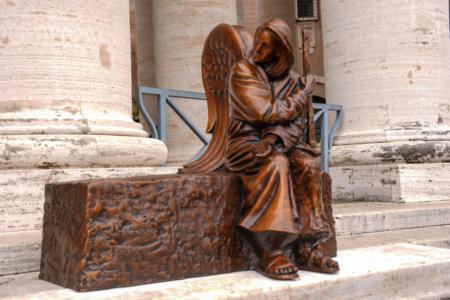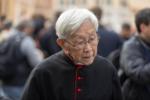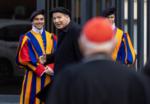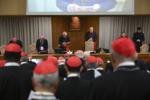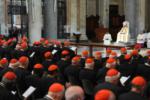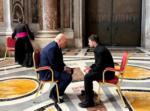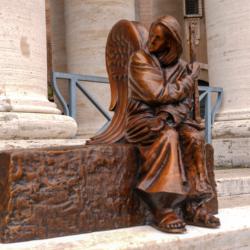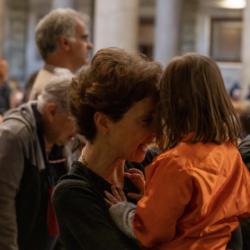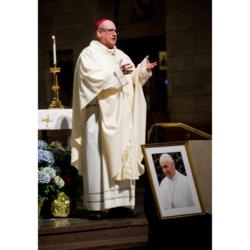Separation between faith and life
In his homily at the Mass celebrating the conclusion of the synod on the Eucharist Oct. 23, Pope Benedict XVI called on all Catholics “to revive their commitment to faithfulness.”
“Eucharistic spirituality must be the inner force for all their activities, and there can be no separation between faith and life in their mission of Christian animation of the world,”he said.
The “animation of the world”is an intrinsic part of what we Christians are called to do. Some would like to see religion moved into the realm of private beliefs, without public repercussions. They would prefer the Church become any other charitable institution following societal norms, but avoid “animating”our culture or laws with a Christian spirit.
The pope’s call for unity between our beliefs and our actions, both as individual Catholics and as Catholic institutions, should impel us to reflect on our behavior. Are we witnesses of Christ and His love even at the risk of rejection by society? Or do we tend to conform to society even if our moral principles are compromised?
As society becomes more secularized and religious freedom comes under greater attack, those questions will increasingly have to be answered by each one of us.
Catholics are not called to abandon the world but to become the salt of the earth, to transform the world in accordance to the will of God for humanity as expressed through revelation and particularly through natural law. As a second century Christian writer put it, “Christians dwell in the world, yet are not of the world.”
So, if some entanglement with evil is inevitable, how much is too much?
The moral theology of the Church has developed a system of thought to help us walk that dangerous, but unavoidable path. It employs principles such as toleration, double effect and cooperation.
The principle of toleration, first articulated by St. Thomas Aquinas, says that an evil performed by others can be tolerated to prevent the loss of a greater good or if, by intervening, an even greater evil would result.
The principle of double effect refers to the unintended consequences of a good action carried out with good intention, as long as both are proportionate to the situation. The Catechism uses self-defense as an example: an individual’s proper desire to preserve his own life could lead to the unintended killing of an aggressor.
Further, moral theology also speaks about formal and material cooperation with evil.
Formal cooperation with evil implies direct cooperation, whether implicit or explicit, in performing actions that are evil. That is always morally illicit and in some cases, such as abortion, leads to excommunication.
Material cooperation involves cooperating in some way with the actions performed by others. Depending on the individual’s level of involvement, it can be classified as proximate or remote cooperation.
Proximate material cooperation occurs when an evil action could not be carried out without one’s cooperation. This cooperation is unacceptable, although guilt can be lessened if the action is taken under duress.
Remote cooperation occurs when one is somehow part of an evil action but the individual’s involvement is not necessary for the action to be performed. In these cases cooperation can be accepted if there are serious reasons for cooperation and if that cooperation would not lead others into scandal.
Of course, the above is simply a brief summary of a very complex issue. In practice, applying these principles to larger issues often provokes disagreement among moral theologians. These disagreements can require that the Vatican or bishops’conferences step in and settle the dispute.
As Catholics we need to understand the moral implication of our actions. When in doubt we must lean on the magisterium for support.
After all, Catholics are called to heed the teachings of the Second Vatican Council that states “In matters of faith and morals, the bishops speak in the name of Christ and the faithful are to accept their teaching and adhere to it with a religious assent. This religious submission of mind and will must be shown in a special way to the authentic magisterium of the Roman Pontiff, even when he is not speaking ex cathedra.”
That is the only way in which faith and life can coexist.
